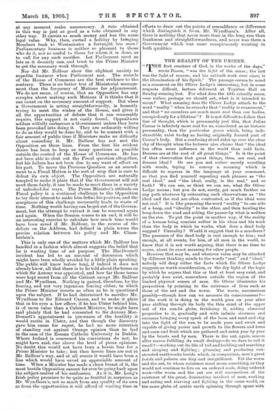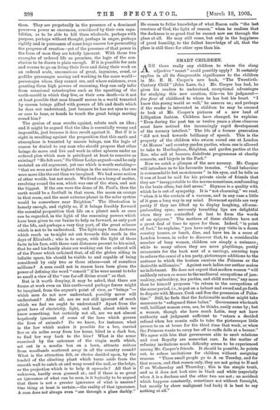" T HE first creature of God, in the works of
the days," wrote Bacon, " was the light of the sense ; the last was the light of reason; and his sabbath work ever since, is the illumination of his Spirit." The passage occurs to mind as a comment on Sir Oliver Lodge's interesting, but in some respects difficult, lecture delivered at Toynbee Hall on Sunday evening last. For what does the title actually mean, —or rather, perhaps we should ask, what is it intended to mean? What meaning does Sir Oliver Lodge attach to the word "reality " when he remarks that " reality is evanescent," and that " we ourselves are much more real than our bodies, occupied only for a lifetime" ? It is not difficult to follow that line of thought, which is presumably just this, that Julius Caesar is infinitely more real for us, considered as an historic personality, than the particular gases which, being inde- structible, exist to-day as having originally formed part of Caesar's body. But a confusing cloud rides up over the clear sky of thought when the lecturer also claims that " the ideal has often more influence in the world than cold facts. Dreams are at the root of all great things." Is it the point of that observation that great things, then, are real, and dreams ideal ? Or are you not rather merely wrestling with words, trying to convey a meaning which is difficult to express in the language at your command, so that you find yourself repeating such phrases as "the real ideal," and " the ideal, really, is the real," and so forth ? We can see, or think we can see, what Sir Oliver Lodge means; but you do not, surely, get much further on any path whatever by reiterating such observations as " the ideal and the real are often contrasted, as if the ideal were not real." It is like gumming the word " reality " to one side of a hoop, and " ideality " to the other, and then bowling the hoop down the road and asking the passer-by what is written on the rim. To put the point in another way, if the reality of a human being consists rather in his ideas and his work than the body in which he works, what does a dead body suggest? Unreality? Would it suggest that to a murderer? The presence of the dead body is real enough to him; real enough, at all events, for him, of all men in the world, to know that it is not worth arguing, that there is no time to argue, about its exact meaning for other people.
However that may be, and whatever value may be attached by different thinking minds to the words "real " and " ideal," nobody will deny either the facts which Sir Oliver Lodge suggests as worth consideration, or the dry light of the logic by which he argues that this or that at least may exist, and probably does exist, somewhere outside the region of the limited physical senses of man. Sir Oliver illustrates his proposition by pointing to the existence of lives such as those of the ant and the worm. The worm, unconscious possibly—though how can we measure its consciousness ?— of the work it is doing in the world, goes on year after year shifting through its body the thin crust of the upper soil of the sun-lit globe, fertilising it, adding chemical properties to it, gradually and with infinite slowness and sureness bringing every speck of the loam and sand and clay into the light of the sun, to be made pure and sweet and capable of giving power and growth to the flowers and trees and corn and fruit which are gathered and eaten year by year by the beasts and by men. There is the ant, again, season after season fulfilling its small destiny—do we dare to call it small ?—working out its life of toil and building and marching and sleeping and fighting ; planning and producing con- structed earthworks beside which, in comparison, men's great hotels and palaces are tiny and insignificant. Yet the worm and the ant, to whom existence must mean something, or they would not continue to live on an ordered scale, doing ordered work—the worm and the ant are still unconscious of the existence of the great, dominating intellect of man, working and eating and starving and fighting in the same world, on the same globe of arable earth spinning through space with bilities, as to be able to kill them wholesale, perhaps with purpose, perhaps without thought, perhaps in anger, perhaps rightly and in pursuance of some huge unseen law permeating the progress of creation—yet of the presence of that power in the form of man they are totally ignorant. With those two examples of ordered life as premises, the logic of the con- clusion to be drawn is plain enough. If it is possible for ante and worms to go on living their lives and doing their work on an ordered scale, unconscious of great, ingenious, cruel, or
godlike personages moving and working in the same world—
personages whom they cannot see, and whose existence, even granting them high powers of reasoning, they can only infer from occasional catastrophes such as the upsetting of the earth-mould in which they live, or their own death—is it not at least possible that man himself moves in a world tenanted
by unseen beings gifted with powers of life and death which he does not understand, just because he has not eyes to see, or ears to hear, or hands to touch the great beings moving round him P
The genius of man revolts against, rebuts such an idea; and it might be argued that the idea is essentially wrong and impossible, just because it does revolt against it. But if it is
right in revolting against the proposition that this earth and atmosphere is tenanted by unseen beings, can the logic of reason be denied to any man who should propose that other beings do move and live and work in other spheres under an ordered plan which man is privileged at least to conceive as existing P "He felt sure," Sir Oliver Lodge argued—and he only restated an old argument, yet one which is worth restating- " that we were not the highest things in the universe ; that we were more like the ant than we imagined. We had some notion of other worlds, but not much. We lived on a lump of matter, revolving round the sun, which was one of the stars, and not the biggest. If the sun were the dome of St. Paul's, then the earth would be a football in that room, the moon an orange in that room, and the most extreme planet in the solar system would be somewhere near Brighton." The illustration is homely enough, and rightly so, if it brings forcibly forward the essential proposition that life on a planet such as ours can be regarded, in the light of the reasoning powers which have been given to our brains to help us forward, as only part of the life, and perhaps a very tiny part, of the great scheme which is not to be understood. The light-rays from Arcturus which reach us to-night set out towards this earth in the days of Elizabeth ; who is to argue, with the light of those facts in his face, with those vast distances present to his mind, that he and his family alone are working out the ordered will of the Power which ordained that, of all the globes riding in infinite space, his should be visible to and capable of being considered by only two or three others—out of countless millions P A man could not in reason have been given the power of defining the word " conceit " if he were meant to take so small a view of the "one far-off divine event" as that.
But is it worth denying, it may be asked, that there are forces at work even on this earth—and perhaps forces might be imagined, from the arguer's point of view, as "beings "- which men do not now understand, possibly never will understand P After all, are we not still ignorant of much which we feel we ought to understand? Apart from the great laws of electricity, light, and heat, about which we know something, but certainly not all, are we not almost hopelessly ignorant of some of the laws which govern the lives of animals ? Do we know, for instance, what is the law which makes it possible for a bee, carried five or six miles away from her home, blind in a dark box, to find her way back to the hive? What is the sense exercised by the antennae of the virgin moth which, set out in a muslin box on a lawn, attracts suitors from woodlands scattered away in all the country round? What is the attraction felt, or choice decided upon, by the tendril of the climbing plant which turns aside from the smooth wall to catch at and wrap round the nail, or the ledge, or the projection which is to help it upwards P All that is unknown, hardly even guessed at; and if there is so great an ignorance of what can be seen, is it logically to be argued that there is not a greater ignorance of what is unseen ?
One thing at least is certain,—the reality of that ignorance. A man does not always even " see through a glass darkly."
Ho comes to fuller knowledge of what Bacon calls "the last creature of God, the light of reason," when he realises that the darkness is so great that he cannot now see through the glass at an. He may still come, but only in the happiness of great humility, to the fullest knowledge of all, that the glass is still there for other eyes than his.







































 Previous page
Previous page